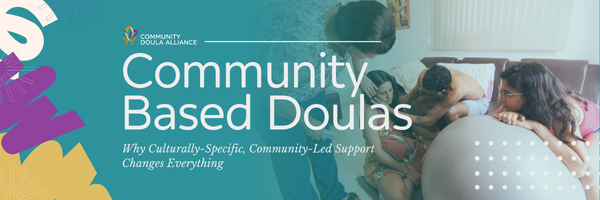Community Based Doulas: Why Culturally-Specific, Community-Led Support Changes Everything
Community-Based Doulas: The Missing Link in Maternal Health Equity
Why Culturally-Aligned, Community-Led Support Changes Everything
In a time when the maternal health crisis continues to disproportionately affect Black, Indigenous, and Latinx folks, one solution has quietly but powerfully emerged in communities across the country: community-based doulas.
These are not just birth workers—they are advocates, educators, healers, and culture-bearers. And they are a vital, yet often underfunded and under-recognized, piece of the puzzle in closing the gap in maternal health disparities.
What Are Community-Based Doulas?
Community-based doulas are trained birth professionals who come from the communities they serve. They typically:
-
Share the cultural background and language of the birthing person
-
Provide longer-term, wraparound support, often from pregnancy through the postpartum period
-
Center their work around trauma-informed, evidence-based, and culturally safe care
-
Often operate within nonprofit or grassroots organizations, prioritizing those most impacted by systemic barriers
These doulas aren’t just attending births. They’re building trust, affirming identities, and walking with families through vulnerable moments with deep-rooted compassion.
The Benefits of Community-Based Doula Support
1. Improved Maternal and Infant Health Outcomes
Numerous studies have shown that doula support leads to:
-
Lower rates of cesarean birth
-
Decreased use of interventions like epidurals
-
Increased rates of breastfeeding initiation
-
Improved birth experiences and emotional well-being
When doulas are community-based, these benefits are amplified, especially among families who face structural barriers in accessing respectful care.
2. Culturally Responsive and Respectful Care
A community-based doula understands the lived experiences, traditions, fears, and strengths of the people they support. They act as cultural translators and protectors, helping clients navigate biased systems while maintaining dignity and autonomy.
3. Continuity of Care in a Fragmented System
Community doulas offer consistent support across a time when birthing people are often shuffled between providers or left alone to figure things out. That continuity—before, during, and after birth—is essential to long-term health and healing.
4. Trust and Advocacy in Medical Spaces
Many marginalized families experience medical trauma, racial bias, and dismissal in healthcare settings. A doula from the same community can serve as a buffer and advocate—helping clients prepare for appointments, ask the right questions, and assert their needs.
5. Empowerment and Reclamation
Community-based doulas often weave ancestral knowledge and culturally grounded practices into their care. This helps families reclaim traditions that colonization and systemic racism have tried to erase. It’s not just about surviving birth—it’s about thriving through it.
Why They’re the Missing Link
The U.S. has the highest maternal mortality rate among high-income countries—and the burden falls hardest on Black, Indigenous, and rural communities. The root causes are not individual behavior, but systemic: racism, poverty, disinvestment, and lack of access to culturally safe care.
Community-based doulas work at the intersection of health, social justice, and community care. They fill the gaps left by a system that too often fails our Black, Latinx, and Indigenous families.
But here’s the thing: they can’t do it alone.
The Path Forward: Invest in What’s Working
If we want real change in maternal health, we must:
-
Fund community-based doula programs at the local, state, and national level
-
Ensure Medicaid reimbursement includes doulas and respects their expertise
-
Support nonprofits and training orgs that are creating accessible pathways for doulas of color
-
Elevate community voices in maternal health policy conversations
Bottom Line –
Community-based doulas are more than birth workers. They’re protectors of life, culture, and dignity. They are the bridge between what the healthcare system offers and what families truly need to feel seen, heard, and safe.
They are not a luxury—they are a necessity.
Let’s fund them. Trust them. Follow their lead.
Because everyone deserves to give birth—and be born—into a world that honors them from the very start.



